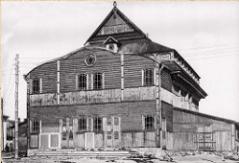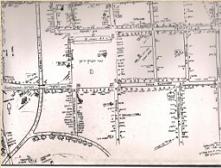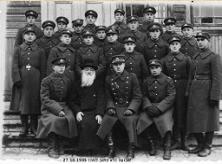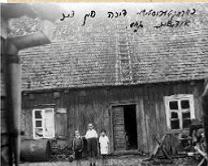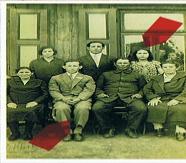Morris L Penn tells his story:
28th September 2001
I was born in Vilkaviskis, Lithuania, which is 15 miles from the border with what used to be East Prussia. My family consisted of my parents Mordechai and Zlata, my brothers Joseph and Raphael, my sister Rivka and myself. I was the youngest of the sons. My brother Joseph had married Rica, a refugee from Suwalki. She and many other Jews came to Lithuania after the Germans occupied Poland in 1939.
Our city had a population of 10,000 with 4,000 Jews. We had 6 Synagogues in one courtyard, an old age home with beautiful gardens, two libraries, a Jewish elementary school, and a high school. We had an ORT school teaching trades. I would say that 75% of the businesses were Jewish. My parents had a grocery and dry goods store. In the Thirties, my father also opened a bristle company and sold the finished goods to Germany.
We had a vibrant Jewish Community and Zionism was in the forefront. All of us belonged to youth organizations. I still remember in the Thirties when David Ben Gurion made a short stopover in our town. I also remember in January 1940, Menachem Begin came to our city and I went to hear him in the theatre.
In June 1940, when I was 18 years old, the Red Army marched in and took over all three Baltic States and some of Poland. After a few days it became clear that hard times were ahead for our family. First they put two Russian officers in our house to live. Later they nationalized the business. It was painful for me to look at my father for what had happened.
Then in May 1941, The Secret Police started arresting people, put them on trucks, and took them to the train station. Their destination was Siberia. They took Lithuanians who belonged to different rightist or fascist organizations, and they also took many Jewish leaders, especially Zionist leaders and capitalists. Of course, the Jews were always the "capore", always to blame. Life was tough, and we did not know what tomorrow would bring.
Just one year after the Soviet occupation, I remember very well that Sunday, five o'clock in the morning, June 22 1941. Suddenly, the house started to vibrate; the pictures were coming down from the walls. We heard explosions, bombing and later we saw the German army marching by our house. The Lithuanians were standing on the sidewalks greeting them with flowers and clapping.
Later that morning, we suddenly heard an explosion, like something had hit our house. We all ran outside, unable to take anything with us. We walked to the outskirts of town into a barn and stayed there overnight. The shooting had stopped and we walked back into the city the next day. We saw what had happened to our house and business. It was flattened, as were many others.
An order came from the SS Commandant that all men 16 years and older should come to the market Square. The three of us brothers and our father went. The Commandant gave a speech. He said we would all go to work and we would get food. He said to obey orders and we would be all right. He said "Remember if you harm one German, we will pick at random 100 of you and they will be shot". The next day we were called for work.
Three days later, early in the morning, the Lithuanian police and one of their right wing organizations ordered all the men to come out into the street. They went from house to house and checked each room. It happened that my mother recognized one of the assistant police chiefs. She asked him if my father and brother Rafael could stay because they were sick, and he told her yes. My oldest brother Joseph and I were lined up with the other men, and they marched us about 100 yards a long a fence. They told us not to talk. They took our watches, valuables, belts and suspenders. Then we marched about one mile to a 3-story building that was a seminary for priests. They ordered us two at a time to go up the steps. They stood along both sides of the steps, and as soon as we started to go up, they hit us with sticks and leather straps.
Then we were ordered to go into a room. By the door stood two policemen. As soon as we walked through the door, they hit us over the head with a board. There were three rooms. In each room they packed about 250 of us. Each room must have been for only 25 or 30 students. We stood there all night. We couldn't open the windows, and many fainted.
At noon the next day, an SS sergeant named Schmidke said, I'll pick 30 men for a special job". By luck or "beshert", my brother Joseph and I were picked for the group. The rest were taken for different jobs. The sergeant marched us to the military barracks. Our job was to fence all the barracks with barbed wire, and we had to do it with our bare hands. The first night we were sent home, and you can imagine when our family saw us bleeding from our arms and hands. The next morning we returned to finish the job. We stayed at the barracks, and the next day, all the men in town 16 years and older were ordered into this area which became the ghetto.
On Sunday, July 27, 1941, the SS issued an order that by five o'clock that evening, all the men in the ghetto would have to deliver so much money, gold and other valuables. In the meantime, the SS started to call 20 men at a time to go behind the barracks and dig pits. Our group of 30 was told to stay in the barracks. The digging went on all day and they dug three pits. We were getting worried and suspicious. WE asked the sergeant what the pits were for. He said, Don't worry. Tomorrow morning they will bring gasoline tanks. The front is moving faster than we anticipated and we the gasoline closer." We kind of believed him somewhat.
The next morning, July 28, I will never forget, six o'clock in the morning, the SS and the Lithuanian police made all the men come out and were lined up five in a row. The sergeant told our small group to stay by the barracks, and in a few minutes he would take us for a job. My brother and I ran over to the line where my father and brother were standing. We told them we were going to work and said goodbye , not knowing that was the last time we would ever see them again.
Soon the sergeant marched us to a brick barracks. He picked six of us for one group and I was picked for the second group. I noticed right away there were five or six Gestapo standing on either side of the entrance, and we had to run inside. They hit us with leather switches with lead on the ends. Inside were wooden crates with guns inside. Each group of six carried one crate, and the Gestapo hit us until we reached the pits about 100 yards away. Later the sergeant called us back to the barracks.
Inside the barracks were little windows. I pulled myself up and saw that they had made the men undress. They were lined up five on one side of each pit and five on the other side of each pit. While the German SS watched, the Lithuanian police fired one shot into the first man's chest so that the same bullet pierced all five, and they fell into the pits. Of course, many of the men were still alive in the pits. I found out later that the nearby townspeople could hear moaning from the pits all night.
Later the sergeant told us to walk to one of the barracks. On the way I noticed one of the barracks was full of clothing from the men. I took a chance and decided to go inside. Somehow I noticed my father's suit coat on top of the pile. I picked up the coat and took out some money from one pocket. I knew that my father kept some money in the coat's lining, but I was too afraid to take the coat.
From the top little pocket, I took out a small picture of my parents. This is the only thing I have of my family. Somehow, I carried that picture with me all the years in hiding, and I still have the picture today.
The sergeant marched our group of 30 to a school that was being used by the SS. They had let out about 60 Jewish men who had been working in the building. They were teachers, writers, manufacturers and their jobs were to clean the rooms and the toilets. From this group of 90 men, they picked 30 for a certain job. Like we say "Beshert" or destiny, my brother and I were picked. The remaining 60 men were marched away by the SS. Passing by the ghetto we could hear the gunshots from where they killed the 60 men.
When we finished our job, the SS men marched us back, and on the way, he told us to sing, like always. We did not respond. They had just that morning killed 900 men and he ordered us to sing. He screamed at us. Finally one of us in the group started to sing the Hatikvah
Out of 900 men in the town, there were only 30 of us left. That was July 28 1941, only five weeks after the war had started. After the war I discovered that this day was Tisha B' Av.
The next day, they ordered all the woman and children, about 3000, to the ghetto. It would be impossible to describe the reactions from the woman and children - the screams, the cries, the shouts, where are they?
Then two mothers came up to me. They called me by name and asked what had happened to the men. I was kind of slow to respond. Suddenly a woman ran up and said "I have good news" Someone had heard that the men were taken to Germany for work. I responded "It could be" Then my mother asked "Zog mir ………. ………. Tell me the truth" I let my head down. She understood and did not question me anymore.
Around mid-August, two farmers who had been our customers got permission from the authorities for us to work on their farms. So we left the ghetto. My brother Joseph and his wife Rica went with one farmer, and my mother, sister and I went with the other farmer.
On September 23, an order came out from the SS commandant that all the Jews wherever they are should come to the city to register the next day. Anyone not obeying the order, when caught, would be shot on the spot. My brother and I had seen what happened, and we decided we would go into hiding. We made plans to leave that evening. My brother and sister-in-law came to say goodbye. In the meantime, the farmer came to me and said, "Don't worry, you will be all right. I need you to help me load a wagon with grain and take it to the city tomorrow.
My mother pleaded with me and begged me not to go, but she later changed her mind. At the time, I didn't realize her thoughts and feelings. Her husband killed, one son killed, the oldest son with his wife had come to say goodbye, God knows if she would ever see them, and here her youngest son is going into the city.
The next morning, September 24, I loaded the wagon with grain and the farmer and I drove to the city. I unloaded the grain and we started back to the farm. I was kind of scared, but happy that no one had stopped me.
It took all day and we came back late that evening. My mother was standing waiting for me. She ran towards me and we hugged and cried together. We decided that we were going to leave that evening. But I was so tired from the trip that I ate some food and fell asleep in the loft of the stable. That night we all slept in the loft. I woke in a daze. I saw a woman laying near me and I asked her,
"Dos bis tu mama? Is that you mother?' In that instance I noticed my sister nearby, I realized it was my mother. I had not recognized her. Overnight she had turned gray. I understood later that my going to town that day had caused her so much grieving.
The next day, we learned that all the woman, children and the few remaining men had been murdered in the ghetto, about 3,000 Jews. We even heard stories that children were thrown against a brick wall in order to save bullets. That day was Zom G'dalyahu, the day of fasting between Rosh Hashanah and Yom Kippur.
That night we left the farm and went into hiding. It was not easy to find someone that would keep you for a long time. We had two disadvantages. First, people knew that we were hiding and talked that the Penn's were alive. Second, we didn't have anything of value to give for food. But that's how it went for three months. A couple of days in one place, a week in another place.
One farmer took us all in. he was a poor farmer and he needed food for his own family. I decided that since I was single, I would go and collect food from the other farmers I knew, and one week later the farmer would pick me up in a village. Every evening I made several stops to collect flour, meat, potatoes and vegetables. A week later, the farmer picked me up and we had a wagon full of food.
The food lasted about four weeks and I decided to make another trip. I waited one week, no farmer. I waited another week, no farmer. I felt something was wrong. I found out that the farmer was afraid to keep my family any longer.
My mother and sister separated from my brother and sister-in-law. I tried to track them down, and in the end of January 1942, I heard the bad news. My mother and sister were taken to jail in the city. One of the neighbors turned them in. The fact that I could not find my mother and sister is always on my conscience, and I will carry that guilt with me the rest of my life.
From 1942 to 1944, I was in hiding mostly by myself, and there are too many stories to tell. There were times I wished that I would not wake up. There were times I thought I was the only one left. I felt that I had to go on so I could tell the Jewish people and the World what they did to us.
During my hiding, I would stay in one place for about a week, sometimes more, sometimes less. I walked only during the night from farm to farm. During winter the fields were covered with snow. Sometimes I wound up in a ditch with snow up to my neck. I learned how to sneak into barns, stables and shacks so that the dogs would not hear me. I cannot tell you how I suffered from hunger, lice and frostbite. There were times when I could not wash myself for months. Sometimes I would spend a couple of days in the fields or woods without food, wet from the rain. Amazingly, I never got sick. Someone must have been watching over me.
Finally in 1944, I got together with my brother and sister-in-law, and later with two other Jews who had escaped from the Kovno ghetto. The Russian front was advancing closer. We decided to build a hiding place with a double floor. Underneath the largest room, we dug out the dirt. There the five of us lived in a cramped space underneath the floor of the house just behind the German front line.
The Russians had stopped about two miles away, the civilians were evacuated to Germany. Neither the Germans nor the Russians moved for two months.
The Germans used the farmhouse during the daytime. You can only imagine how we felt the first day the Germans were walking over our heads. WE could hear their shouting, how the Russians were fighting like lions. And our hearts were pounding when they walked over our heads with their boots. Little by little the five of us got used to it.
Two months later, we heard artillery and bombing. We heard tanks passing over the courtyard. I opened the cover to our hiding place and saw a Russian soldier near a tank, maybe 30 feet away. I shouted, "Crasny Army, Red Army". He said "Da", and little by little we all crawled out. You can imagine our happiness. We were given permits to go anywhere we wanted. And that's how we were liberated on October 16, 1944.
There are no official records, but out of the 4,000 Jews from my town of Vilkaviskis, I think only about 80 survived the Holocaust. Out of the 900 men, I believe only five survived in hiding, including my brother and me.
That day we went back to our city of Vilkaviskis. Everything was destroyed. We went to the train station, and with lots of begging, they let us ride to Kaunas on the roof of the train.
We knew from the beginning that we were not going to stay in Lithuania. We wanted to go to Palestine. We looked for ways to escape to Poland, but you had to have papers. We went to Vilnius, and after the third try, we made it over the Polish border. We gave all the money we had saved to the border patrols.
Through the Bricha [the illegal Jewish emigration network] we went to Lodz, Bratislava, Vienna, and wound up in Bindermichel in Austria, a displaced persons camp. My brother, his wife and their baby girl Sandra moved to Badgastein, Austria, and I stayed in Bindermichel.
There were 5,000 people in Bindermichel and I was in charge of security. I used to get paid with extra UNRA packages, and bring some to my family. It happened on my first visit to Badgastein, I met Linda. She lived with her mother Riva in the next room, and I visited from time to time.
We were waiting to go to Israel, but in the meantime, the war broke out in Israel.
Transcribed by Ralph Salinger
December 10th 2007 from a booklet held by Mrs. Gila Shoham of Ramat Gan, Israel
